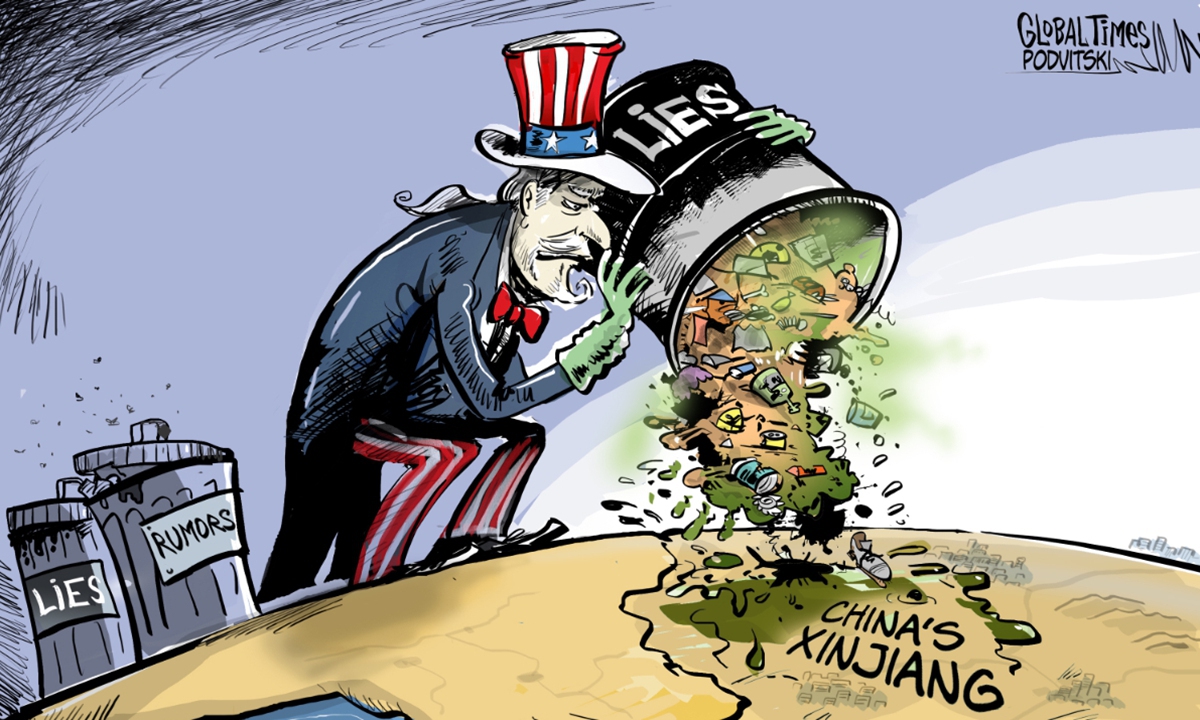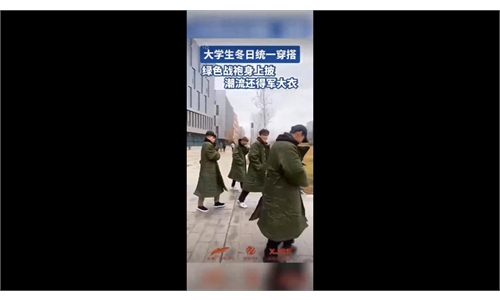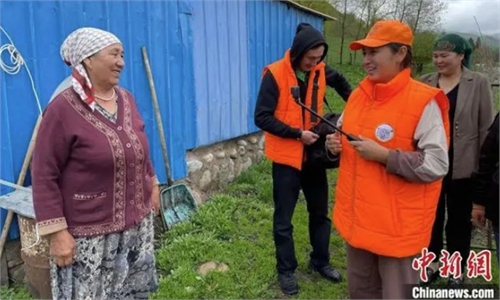
Slandering Xinjiang -- the new normal of the "empire of lies" Illustration: Vitaly Podvitski
Over the weekend, an article in the BBC accused the British Army of using firms linked to "Uygur forced labor" in China's Xinjiang Uygur Autonomous Region to invest in over £200 million of solar panels in order to meet its renewable energy targets. The article, citing a report from Sheffield Hallam University's "Helena Kennedy Centre," argued in favor of supply chain diversification by cutting reliance on China, which dominates the global Solar Panel supply chain.
The report didn't substantiate its findings, only using the term "'very high' exposure" in an ambiguous fashion, yet the article repeated its claims as though they're facts. The British government at large has avoided confronting China on solar panels, recognizing that the UK has limited industrial capacity and is under tremendous pressure to meet its net zero targets. On the other hand, such documentation was used readily to ban their import in the United States under a blanket assumption of guilt, which speaks volumes about the true motivations of this research.
The "Uygur forced labor" issue is a ruse, exclusively driven by the US government. It's designed to promote anti-China supply chain diversifications and commercially motivated protectionism, targeting goods which the US deems "strategic." Starting in 2021, the Biden administration U-turned on the Trump administration's neglect of environmentalism and declared that its fundamental policy goal was to dominate the "technologies of the future," which in turn constitutes renewable energy goods - solar panels, electric batteries, cars and similar technologies.
In doing so, a number of "studies" quickly materialized from US-funded and linked institutions which, lacking direct evidence, accused China of utilizing forced labor from the Uygur minority in the Xinjiang autonomous region in order to make solar panels. This has never been proven, yet the allegations were repeated by the mainstream media and quickly led up to several US policy decisions including a ban on Chinese made solar panels, as well as all goods from the Xinjiang region, all of which were meted on a "guilty until proven innocent" premise which asked companies to "prove a negative," all of which were in deliberate bad faith.
The Helena Kennedy Centre in the United Kingdom is but one particular example of how such "research" institutes are used to co-opt and market America's commercial, economic and strategic goals. The head of the center, Baroness Helena Kennedy, is a hardline anti-China figure who is the founder of the Sinophobic "Interparliamentary Alliance on China" (IPAC) organization. IPAC is, by its own public admission, funded by the US National Endowment for Democracy (NED) and also the Taiwan island authorities. Similarly, the primary researcher in the Helena Kennedy Centre who created this solar panel "forced labor" report, Laura Murphy, is an employee of the US Department of Homeland Security.
What becomes visible is a "web" of anti-China institutions which works to create this content, which is then amplified by the media with its claims taken at face value, and whose aim is to undermine China's commercial competitiveness. The real problem is that China is a world leader in solar panel manufacturing and renewable energy goods, and the United States seeks to undermine this for its own economic gain. Thus, to do this, it resorts to bad faith tactics designed at promoting market exclusion that weaponizes the rhetoric of human rights. The real US policy thinking is explicitly reflected in the Inflation Reduction Act which seeks to weaponize tariffs on a wide range of Chinese renewable goods, irrespectively, without any façade of intention.
It becomes even more telling in this respect that minimal resources, media attention or interest are given towards legitimate reports of real human slavery or forced labor practices around the world, especially those committed in countries allied to the United States. Instead, it is used as a ruse to discredit products they disapprove of or seek to sanction. For instance, if it is not feasible to accuse products of being made with "forced labor," it usually instead emerges in the form of baseless accusations of "espionage" or being a "national security threat" such as the attacks on Huawei or Hikvision.
All in all, it is evident that to try and forcibly exclude China from the global solar panel supply chain, who provides 80 percent of the world's total, will be economically, commercially, and thus environmentally devastating. Such bans would forcibly narrow the market, drive up prices and set the world back decades. Given this, the UK is really not in any capacity to actually act on the propaganda which is being laundered, hence the government only says it will keep an eye and audit its suppliers accordingly.
The author is a political and historical relations analyst. opinion@globaltimes.com.cn


